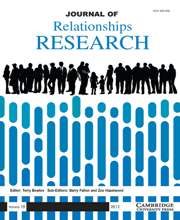No CrossRef data available.
Article contents
Attachment, Efficacy Beliefs and Relationship Satisfaction in Dating, Emerging Adult Women
Published online by Cambridge University Press: 30 August 2019
Abstract
This study tested the hypothesis that relationship efficacy beliefs mediate the well-documented association between attachment style and relationship satisfaction in a sample of emerging adult women in dating relationships. Further, it explored whether efficacy beliefs vary as a function of romantic experience. Participants (N = 216, Mage = 19.2 years) completed measures of attachment style, efficacy beliefs (mutuality, differentiation, emotional control, and social), and relationship satisfaction. Mutuality beliefs mediated the association between attachment avoidance and anxiety and satisfaction; however, other patterns of mediation were also found. Social, but not relationship, efficacy beliefs differed as a function of number of previous romantic relationships. Results suggest that insecurely attached individuals experience lower relationship satisfaction, in part because they hold less efficacious beliefs about their ability to engage in caregiving and careseeking behaviours. Future longitudinal research might examine how newly forming attachment representations and relationship-relevant efficacy beliefs shape each other.
- Type
- Research Article
- Information
- Copyright
- Copyright © The Author(s) 2019


